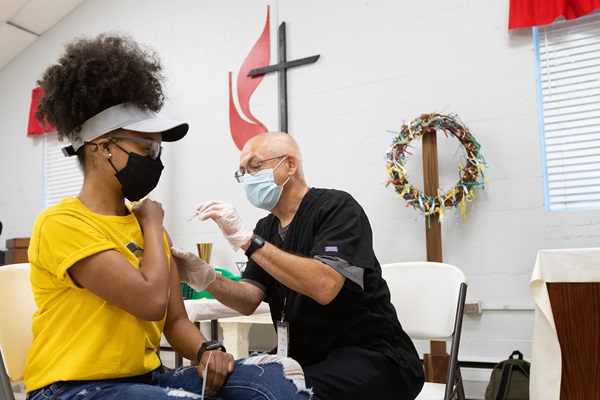Conversations about COVID-19 vaccines are opportunities for mission, United Methodist Global Ministries' leaders say, adding that United Methodists can love their neighbors by participating in the discussions.
How you can help
- Churches can maintain a list of local immunization centers to provide to members, as well as to others in the community.
- Offer to provide rides to anyone who needs transportation to get a vaccine. [Note: Through July 4, 2021, rideshare companies Uber and Lyft are providing free rides to U.S. vaccine sites to those receiving vaccines.
- Make a gift to UMCOR COVID-19 Response Fund (Advance #3022612) online here or by sending a check to Global Ministries/UMCOR, P.O. Box 9068, New York, NY 10087-9068. Please write Advance #3022612 on memo line.
Though the COVID-19 vaccine has become more available, particularly in the United States, misinformation, mistrust and lack of access keep some communities at risk. The church, however, can be part of the solution.
“When you’re protecting yourself with the vaccine, you’re also protecting your community. When you’re helping people who are without access to knowledge (about the vaccine) and without access to the vaccine, that’s part of mission and part of loving your neighbor,” says Kathleen Griffith, Global Health team lead and senior technical advisor at General Board of Global Ministries.
The denomination’s Abundant Health campaign, launched in 2016, promotes mental, physical and spiritual well-being for all people. Talking about the COVID-19 vaccine aligns with all three objectives.
“We want to help people understand that these vaccines are proven to be successful and are already decreasing the spread of COVID-19. By giving people information, we want to empower them to make decisions for themselves and understand how to protect themselves, their families, their congregation and their community,” says Griffith.
While COVID-19 has affected the entire world, Griffith recognizes that marginalized communities, specifically people of color, have been more adversely affected. For some people, the inability to take off work or to find transportation to a vaccination site has prevented access. Mistrust of vaccines that goes back several decades continues to keep some people from getting vaccinated, as well as lack of accurate and trusted information regarding the vaccines themselves. For example, the vaccine does not contain a microchip, Griffith states.
The obstacles are real, Griffith acknowledges, but the vaccine conversation offers a way across the chasm of mistrust, misinformation and disconnection. When trusted leaders share facts, concerned neighbors offer to help one another and our global population has access to vaccines, we start making our way back to a place of community.
“Let’s not let COVID-19 be an end in itself,” Griffith states. “In this call to immunization against COVID, this call to mission from the heart, this call to community, there is value added. So when COVID is gone, we continue this loving service for each other.”
Crystal Caviness works for UMC.org at United Methodist Communications. Contact her by email or at 615-742-5138.
This content was published May 26, 2021.





